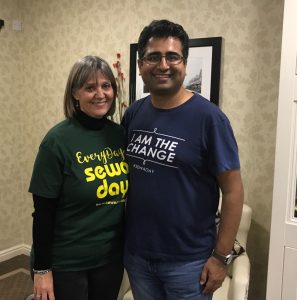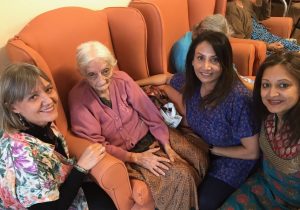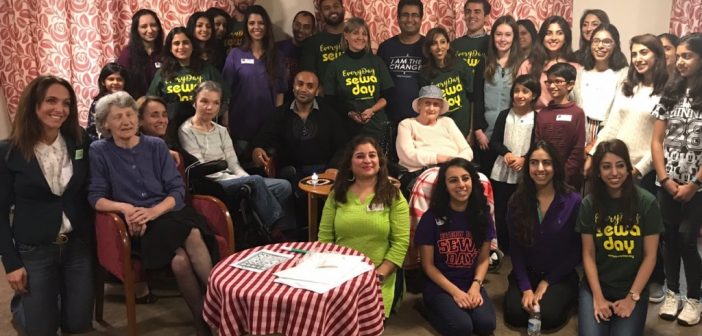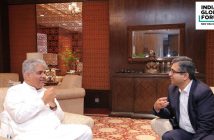At the centre of the Dharmic traditions of Ancient India is the altruistic concept of Sewa, an idea that involves performing acts of kindness without the expectation of reward or return.
In that spirit, Hindus across the UK celebrated Sewa Day last Sunday, coming together in acts of extraordinary kindness and commitment which took them outside of their regular routines.
Projects ranged from food collections in North London to home fire safety surveys in West Yorkshire, and this collective social action brought many faiths together.
This might sound familiar to readers of Jewish News as, of course, this is the Hindu community’s inflection of your own Mitzvah Day.
 Manoj Ladwa with Mitzvah Day founder Laura Marks
Manoj Ladwa with Mitzvah Day founder Laura Marks
Indeed we were delighted to be joined by many of our Jewish friends on Sewa Day, and look forward to repaying their kindness when Mitzvah Day takes place on Sunday 19 November.
In today’s world of division and mistrust, it was particularly heartening to people of our faith to see the support given by Jewish people and those of other religions.
We should always remember that what brings us together is stronger than that which divides us.
Hindus and Jews have so much in common, especially with our diaspora experiences in the UK.
Sewa Day – now in its eighth year in the UK – shares with Mitzvah Day a commitment to banish divides between faith communities.
And indeed, it was a joy to see this expression of friendship and collaboration between the Hindu and Jewish faiths throughout Sunday.
Personally I was joined on my Sewa Day trail – visiting care homes and food banks – by Mitzvah Day’s founder Laura Marks and interfaith chair Daniela Pears.
 A Sewa Day event, with Mitzvah Day’s Laura Marks (left)
A Sewa Day event, with Mitzvah Day’s Laura Marks (left)
Together we spread the message of both Sewa and Mitzvah.
These ideas, of Sewa and Mitzvah, have an unmistakably edifying effect on communities, giving the community an opportunity to look at their circumstances and redress what we might be missing from their lives.
One act stood out to me as an act of Sewa that still remains seriously under-represented in the Indian diaspora: organ donation.
I saw for myself the effort of the Swaminarayan Temple in Kingsbury on Sunday, which, as well as arranging a local food collection for the homeless, established an NHS blood donation centre and an organ donation signup centre.
Again here, we can take inspiration and advice from people of Jewish faith – who have much better rates of blood and organ donation. On an individual level, it’s this sort of friendship and encouragement that can help save lives.
Looking ahead to the future – I would like to see the idea of Sewa Day become more widespread across the UK and Europe, helping to restore trust in community and end the waves of social tension that followed Brexit.
Like Mitzvah Day, Sewa Day encourages Hindus to do something that will have a lasting effect. I am convinced that in coming together, the Hindu and Jewish communities can be the best possible example of cohesive co-existence.







